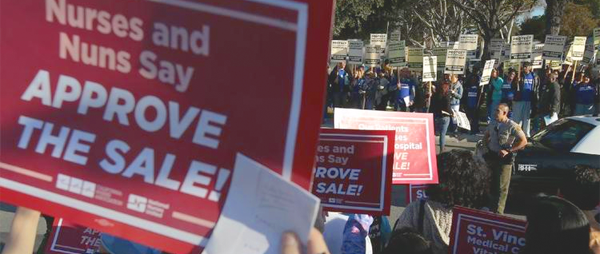News
Let Prime Healthcare buy Daughters of Charity's hospitals

Dughters of Charity Health System, a Catholic nonprofit that operates six hospitals primarily for poor and elderly Californians, is reaching the last bead on its fiscal rosary. The chain is losing money at an alarming rate and wants to sell itself to Prime Healthcare Services, but prominent Democrats and a powerful union have called on Atty. Gen. Kamala Harris to block the deal. For all its faults, however, Prime remains the best hope for keeping the six hospitals open and their vital services operating. Harris should approve Prime's purchase with conditions designed to keep it from abandoning the Daughters' mission and abusing the healthcare system.
Daughters operates St. Francis and St. Vincent medical centers in Los Angeles County and four others in the Bay Area. There's a strong demand for the acute-care and trauma services they provide, and surrounding hospitals aren't equipped to handle the extra workload. That's true even in South Los Angeles, where a new Martin Luther King Jr. Community Hospital is set to open this year with about a third as many beds as St. Francis.
Although St. Francis was in the black as recently as 2013, the chain's losses have been growing, hitting $130 million last year. And with a short-term loan expiring soon, it teeters on the precipice of bankruptcy. Going into bankruptcy wouldn't necessarily close the hospitals, but the process would almost certainly lead to cuts in workers' dangerously underfunded pensions and in the hospitals' services.
Harris' goal should be to prevent those things from happening, which means keeping the system out of bankruptcy. And considering the perilous state of the Daughters' finances, there's no time to search for new buyers willing to take over the entire system, which appears to be the only financially viable approach.
With a short-term loan expiring soon, [Daughters of Charity Health System] teeters on the precipice of bankruptcy. -
The bidding process yielded only two such possibilities: Prime and Blue Wolf Capital, a private equity firm. Blue Wolf's complex offer calls for the firm to manage the chain (for a hefty fee) while attempting to turn around its finances by cutting costs, raising revenue and mortgaging the medical office buildings. If these efforts were successful, Blue Wolf proposed, it could buy the chain for an amount equal to its liabilities.
But the investment bankers who reviewed Blue Wolf's bid raised concerns about the hospitals being saddled with too much debt and not enough capital. The firm also offered no deposit or any other protection for Daughters in case the deal collapsed.
Daughters chose Prime because it would buy the system outright and assume its liabilities. It also pledged to keep the hospitals open and the services intact for at least five years while protecting the workers' pensions. Those are all important commitments, provided they are enforceable. What's troubling about Prime, though, is the tactics it has used to boost per-patient revenue and pull troubled hospitals out of the red. Among other things, critics accuse the company of canceling insurance contracts to increase out-of-network billing and diagnosing unusually high percentages of obscure and expensive ailments.
Some of Prime's critics argue that Harris shouldn't reward this behavior by approving the sale. But the people who rely on the six Daughters' hospitals don't care what Prime did while it was scratching out a foothold in the industry, before it could command favorable rates from insurers. They care what it would do going forward. And so should Harris.
Under state law, the attorney general must consider whether the sale may significantly affect the availability or accessibility of healthcare services to the community and whether it's in the public interest. The former criteria give Harris the right and the obligation to impose conditions on the sale that commit Prime to keeping the hospitals open and key services available for the long term. The latter gives her the ability to impose conditions barring Prime from using its clout to gouge payers and requiring the company to support alternative payment systems to slow the growth of healthcare costs. Prime believes it can turn the Daughters' hospitals around not just by collecting more from insurers, but also by cutting overhead and providing better, more efficient care. It should have the chance to do so.
Originally posted: http://www.latimes.com/opinion/editorials/la-ed-daughters-of-charity-20150202-story.html